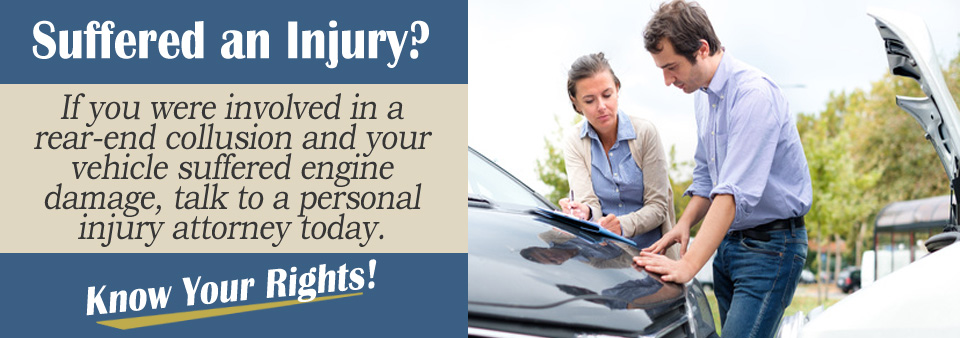Estimated Read Time: 9 Minutes
If you are stopped at a traffic light or stop sign or if you are driving down the road when you are hit from behind, you know the impact can be severe.
Such an impact can lead to heavy body damage and even mechanical damage to your vehicle. Motor damage will not result from a rear-end collision, but there are damages that can impact your car's drivetrain.
The impact can shove the exhaust system forward, which can then cause damage to the exhaust manifold, catalytic converter, engine mounts, or a "Y" pipe which runs into your car's engine.
Engine Damage After Accident
If your vehicle has been rear-ended, it could suffer a variety of damages. While there could be engine damage, there could be other physical and mechanical damage suffered as well. It is imperative to take your vehicle to a qualified automotive repair facility so it can be thoroughly inspected, and all the damage can be discovered and properly addressed.
You want to make sure you ask to be compensated for all your damages through a personal injury claim. Be sure to get detailed estimates and to have everything thoroughly checked to determine what has been damaged and the cost of fixing all the issues caused by the crash.
What To Do After A Rear-End Collision
If you have been in a rear-end collision, you can visibly see any body damage to your vehicle. On the other hand, you might not realize any mechanical damage took place right away.
Because you need to notify the insurance company of any damages your vehicle suffered in the crash, you need to take your vehicle to a qualified auto mechanic for a thorough inspection.
Your mechanic can tell if any damage was done to your vehicle. He can also provide a written statement indicating his opinion that the damages were the result of the crash.
In some instances, the insurance company might require a second opinion. They might enlist the help of a second mechanic to ensure the damages were caused by the accident.
Sometimes the insurance company might even say mechanical damages did not result from the accident and they might not want to pay for the costs.
Mechanical repairs after a crash can be very expensive, so if you are in a dispute with an insurance company should consult with an auto accident lawyer who will help you pursue compensation for the damages that resulted in the accident.
A variety of mechanical damages can be caused by a rear-end collision. Common mechanical damages from such an impact involve the suspension or transmission.
It is important to make sure the mechanical aspects of the vehicle are checked when an estimate is given for repairing your vehicle's damages after the auto accident.
Inquire with the body shop about mechanical issues or see if you need to contact your own mechanic to come and inspect the vehicle's mechanical parts.
Be Aware of the Invisible Car Problems
You might also notice that your car just “feels” different after getting rear-ended while stopped collision. Although you might not be able to see anything wrong, this could be a sign of an underlying problem created by the accident. If the car handles differently, pulling one way for example, the alignment of your car may have been changed. Worse handling clearly has a negative impact on the safety of your car and poor alignment also puts additional stress on your tires and suspension system. Another change you might notice is how cleanly the trunk of your car closes. At a minimum, this means that the shape of your car is changed and in an extreme case you could find yourself with an open trunk traveling down the highway.
Cars have been manufactured to keep you safe with an incredible amount of precision. Any small changes might have an adverse effect on the ability of the car to react correctly if you are unfortunate enough to be involved in another accident.
Transmission Damage
In addition to engine damage, your vehicle could suffer damage to the transmission. A rear-end collision is like a ripple effect that goes through the entire vehicle. When the impact ripples through the car, there is a high probability of your car’s transmission suffering damage.
This is especially true if you drive an all-wheel drive or a rear-wheel drive vehicle. If your vehicle is a front-wheel drive, the chances of transmission damage are minimal.
Vehicles that are all-wheel drive or rear-wheel drive have their transmission located closer to the rear of the vehicle. After a rear-end collision, you should make sure a mechanic carefully inspects your car’s transmission for any leaks or indications of damage. Some of the more telling signs of transmission damage after a rear-end collision include the transmission slipping.
This could be evident through problems with acceleration, which means that the vehicle will struggle to get into the right gear and gain speed. While it may finally attain the desired speed, it may take much longer than usual to do so. If your car is not shifting gears normally, shifts into the wrong gear, or if it makes clunking noises during shifting, then there could be loose components in your transmission from the impact.
If there is a problem with the transmission and you keep driving your vehicle, the problem can worsen and cause even more damage. Metal particles from broken components can fall into the coolant then push its way through the cooling system and lead to even more issues.
Check your transmission to make sure it isn’t leaking fluid. If there is a leak, be sure to have it checked quickly because the longer you wait, the more extensive repairs your vehicle may need and the more it will cost to fix the problem.
Also, watch to see if there is a check engine light on, a transmission warning light, burning smells, whining, shaking or grinding noises, a clutch that drags, or any unusual signs or symptoms from the vehicle.
Body Damage
When there is a rear-end collision, vehicles suffer body damage. An auto body repair facility will need to take care of these issues. Common damages suffered in a rear-end collision usually involve the bumper, bumper cover, taillights, trunk, rear fenders, and trunk. A severe rear-end collision could even cause the back windshield to shatter and can cause damage to the back wheels.
An auto body repair facility can fully asses the damages and prepare a written estimate for fixing the damages to your vehicle. You will want to make sure all damages are fixed properly so the safety and integrity of your vehicle aren’t compromised. Make sure your car gets a thorough inspection and you get a detailed estimate before any repair work gets underway.
In some cases, frame damage may result. Sometimes frame damage may be repaired, but if damage is extreme it could result in your vehicle being a total loss. That is true in cases where the cost of repairing the damage is more than the value of your vehicle. The automotive repair technician will be able to assess the damages and determine if your vehicle is repairable or if the damage is so severe it is a total loss.
After a rear end accident, you may ask yourself what damage can a rear end collision cause? There are many trunk-related damages that can occur after a rear-end accident, even when your car looks okay, such as unexpected lip pop ups.
For example, you could be driving on the highway one day and your truck flies open suddenly. Another possible damage to your trunk could be the trunk not staying closed. Your car wheels are also susceptible to damage. When your wheels are out of alignment you may experience unusual vibrations, wobbly steering wheel and car tracking unevenly down the road.
When your car has been involved in any type of collision, even when the damage seems minimal, don’t take chances with hidden complications that can endanger your safety.
Filing a Claim For Engine Damage
If your car suffered engine damage in a rear-end collision, you will want to ask for it to be covered as part of your personal injury claim. When you pursue a personal injury claim, you will want to make sure all your property damages are added up and included in the total value of the damages that you are asking to be compensated for in your claim.
You will need to provide supporting evidence that shows your damages. This will include photos of the accident scene, photos of the damages, a copy of the accident report, and a written repair estimate that shows all the damages that your vehicle suffered in the crash.
You may need to provide documentation that shows your car wasn’t experiencing these mechanical issues with the engine prior to the rear-end collision. This can be done by providing copies of your vehicle maintenance and service records.
Be sure your vehicle damage is itemized – include body damage, mechanical damage such as engine damage and transmission damage, and so forth. You will want to include all your losses, which will include personal injury as well. You can gather you evidence and present it in a car accident demand letter.
Consult With A Personal Injury Attorney
If you have been in a rear-end collision, you should consult with a personal injury attorney. Your lawyer can help you pursue a personal injury claim to recover compensation for the damages that resulted from the crash.
The damages can vary greatly but might include:
- Medical expenses
- Pain and suffering
- Lost wagesProperty damages
Documentation will be needed to support your claim and to show the damages that resulted.
Working on a contingency basis, your attorney will not be paid until he or she gets you a settlement or judgment. Instead, your attorney will not be paid until you win your claim and recover compensation through a judgment or a settlement for your rear-end collision auto accident injury claim.
If you have been involved in a rear-end collision that caused your vehicle to suffer damages, you should enlist the help of a personal injury lawyer who handles auto accident injury claims in your area.
Complete the Free Case Evaluation Form on this page to share the details of your case. There is a statute of limitations for pursuing a personal injury claim. If you wait too long, you will not be able to recover compensation for your damages. Talk with a lawyer to determine the best way to proceed with your personal injury case after a rear-end collision.

